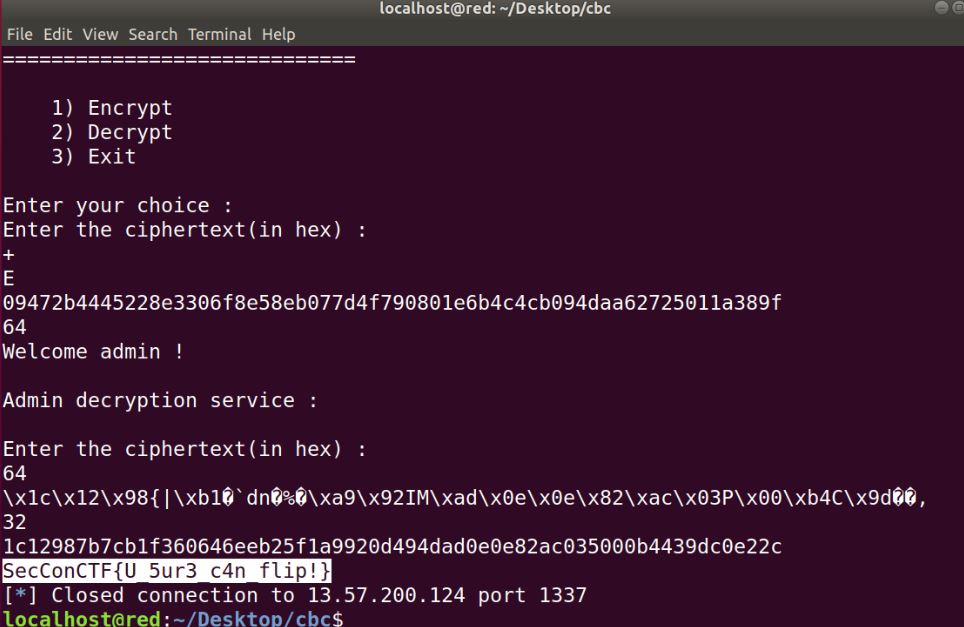Cisco SecCon CTF 2019
21-10-2019
After solving all the challenges in online quals of this CTF, I went to Bangalore for onsite finals. I managed to secure 5th rank but I should have done better if I had studied about RSA. So now a days, I’m working on my crypto skills.
Quals (the scoreboard was hidden by organisers) :
This challenge includes AES-CBC bit-flip attack and AES-CBC IV detection. This is one of the challenges in online quals. This is going to be my first crypto writeup. Enjoy :)
Provided script:
#!/usr/bin/env python
import os
from Crypto.Cipher import AES
from Crypto.Util.number import *
from secret import FLAG
key1 = os.urandom(16)
class Unbuffered(object):
def __init__(self, stream):
self.stream = stream
def write(self, data):
self.stream.write(data)
self.stream.flush()
def writelines(self, datas):
self.stream.writelines(datas)
self.stream.flush()
def __getattr__(self, attr):
return getattr(self.stream, attr)
sys.stdout = Unbuffered(sys.stdout)
def pad(m):
tmp=16-len(m)%16
return m+chr(tmp)*tmp
def unpad(c):
polarity = ord(c[-1])
if polarity > 15: raise AssertionError("Incorrect Padding")
return c[:-polarity]
def admin_decrypt(c) :
cipher = AES.new(key1, AES.MODE_CBC, FLAG)
return (cipher.decrypt(c))
def Encrypt(inp,iv):
cipher = AES.new(key1, AES.MODE_CBC, iv)
return (iv + cipher.encrypt(pad(inp))).encode('hex')
def Decrypt(c):
c = c.decode('hex')
iv,c = c[:16], c[16:]
cipher = AES.new(key1, AES.MODE_CBC, iv)
#from IPython import embed; embed()
return unpad(cipher.decrypt(c))
def banner():
TITLE = "Encryption/Decryption Service"
print('=' * len(TITLE))
print(TITLE)
print('=' * len(TITLE))
MENU = """
1) Encrypt
2) Decrypt
3) Exit
"""
print(MENU)
if __name__ == "__main__" :
print(chr(27) + "[2J")
count = 0
while count < 3 :
banner()
ch = int(raw_input("Enter your choice :"))
iv = os.urandom(16)
if ch == 1 :
m = raw_input("Enter the plaintext :")
if 'admin' in m :
print "Username can't be admin"
continue # or break instead
print Encrypt(m,iv)
continue
elif ch == 2 :
c = raw_input("Enter the ciphertext(in hex) :")
m = Decrypt(c)
if m[:5] == "admin" :
print "Welcome admin !"
print "Admin decryption service :"
ct= raw_input("Enter the ciphertext(in hex) :").decode('hex')
if len(ct) > 32:
print("Ciphertext can't be greater than 32 bytes")
continue
print admin_decrypt(ct)
else :
print m
else:
break
count += 1
print("See you next time!")
This challenge includes two things:
-
CBC bit-flip : Our goal is to find the ciphertext for plaintext “admin” to call
admin_decrypt(ct). The service offers to give ciphertext of our plaintext. But we can’t send “admin” as plaintext. We need to reach the “Admin decryption service” and it checks whether the first 5 bytes of decrypted plaintext is “admin”. So we send “admiX” as plaintext and gets its ciphertext. Then we do XOR(cipher[4], ‘X’, ‘n’) and replace it with cipher[4]. So now we have ciphertext of plaintext “admin”. -
CBC IV detection : So now we are admin. Next step is to find IV(Initialization Vector) used to decrypt our ciphertext. Providing “\x00”*16 as ciphertext gives decrypted plaintext. Now XOR(plain[:16], plain[16:]) gives the IV i.e. FLAG.
from pwn import *
r = remote('13.57.200.124', 1337)
print r.recv()
r.sendline('1')
print r.recv()
r.sendline('admiX')
enc = r.recvline().replace('\n', '')
enc = enc.split(':')[1]
print enc
tmp2 = enc
print r.recv()
r.sendline('2')
print r.recv()
enc = enc.decode('hex')
to_send = enc[:4] + xor(enc[4], 'X', 'n') + enc[5:]
to_send = to_send.encode('hex')
r.sendline(to_send)
print r.recvuntil("Enter the ciphertext(in hex) :")
# Got admin
tmp2 = '00'*32
r.sendline(tmp2)
t = r.recv()
flag = xor(t[:16], t[16:])
print "SecConCTF{" +flag + "}"
FLAG: SecConCTF{U_5ur3_c4n_flip!}

